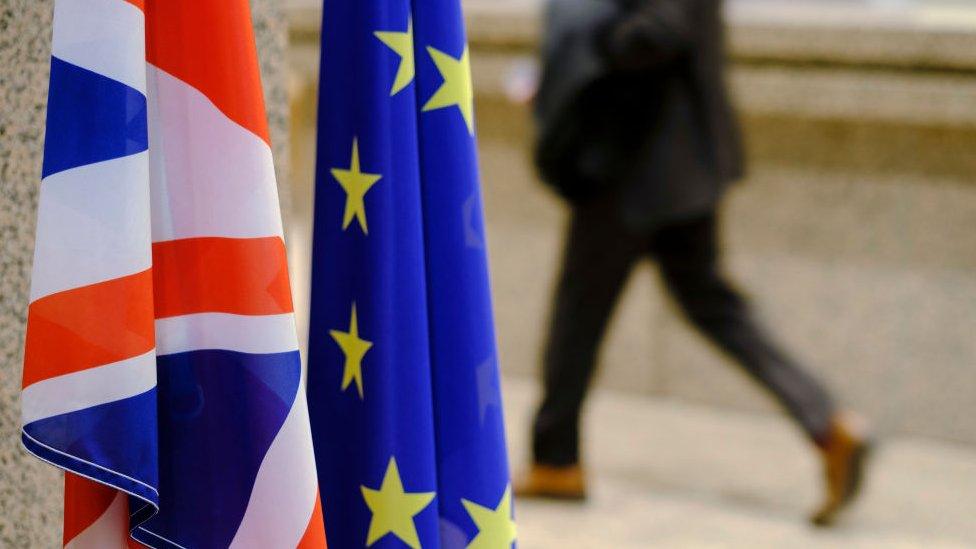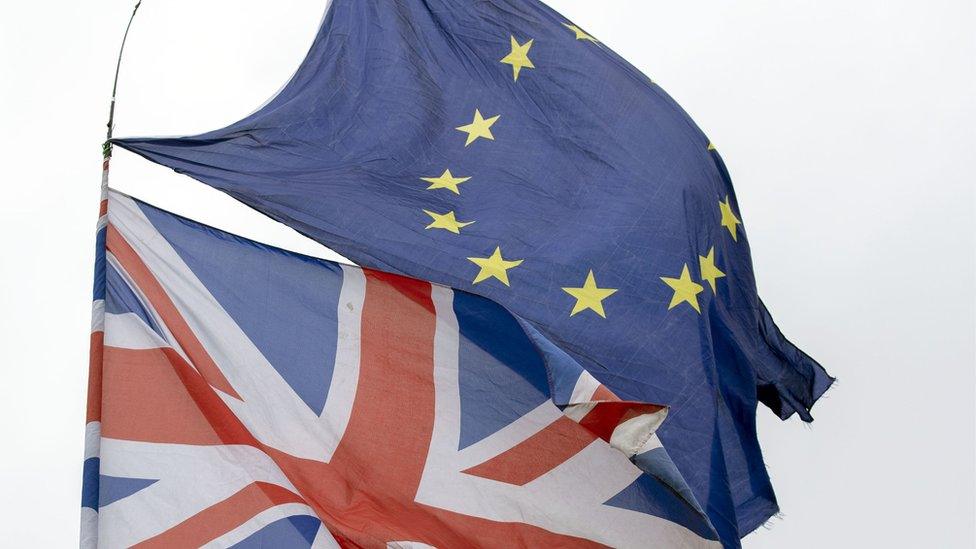Brexit: UK hopeful of EU trade deal next month, says No 10
- Published
- comments

Negotiations over a free trade agreement between the UK and EU began in early March
The UK still believes it can agree a post-Brexit trade deal with the EU next month, according to Downing Street.
The PM's spokesman said UK negotiators would "continue to plug the gaps" when talks enter their seventh round in Brussels on Wednesday.
The two sides remain divided over competition rules, fishing rights and how a deal would be enforced.
The UK has ruled out extending the December deadline to reach an agreement.
This week's talks are the last scheduled negotiating round, external ahead of the autumn, although both sides have previously said talks would continue in September.
EU chief negotiator Michel Barnier had dinner with UK counterpart David Frost on Tuesday evening, with talks set to conclude on Friday.
On Tuesday, ahead of talks resuming, a European Commission spokesman said a deal would need to be agreed by October "at the latest".
Mr Barnier has said an agreement is required by this date so it can be ratified before the UK's current post-Brexit transition period ends, in December.
After the last negotiation round in London, he accused the UK of not showing a "willingness to break the deadlock" over difficult issues.
Mr Frost said EU offers to break the deadlock had failed to honour the "fundamental principles which we have repeatedly made clear".
But he said the UK, which has so far insisted on a series of separate deals in different areas, was also willing to consider a "simpler" structure for an agreement.
He added the EU had shown a "pragmatic approach" over British demands to limit the role of the European Court of Justice after the transition period ends.


Compromises on both sides are inevitable if a deal is to be struck, but don't expect breakthroughs this week.
For now, much of Europe is still on holiday, or dealing with the coronavirus crisis. Boris Johnson is also busy dealing with the fallout from the exams U-turn.
The EU wants a deal, but the keenness for an agreement - even a thin one - doesn't mean they will settle for a deal at any price.
France is jumpy that Michel Barnier may be so keen to be seen to get a deal done with UK this autumn that he "could be tempted to give away too much".
Meanwhile, German Chancellor Angela Merkel repeats over and over that the EU won't agree to anything it believes would damage its single market.
The EU believes Mr Johnson needs to show he can reach a deal, especially after controversy surrounding the government's initial handling of Covid-19.
But the politics of compromise shouldn't be underestimated. Compromise can be found - but if it comes it is likely to be last-minute, around October time.
The EU thinks a deal is still more likely than no deal. But only just.

Among the issues the negotiating sides will discuss this week are transport, police co-operation, fishing rights and rules on investment.
They will also discuss post-Brexit rules on competition and state support for companies, one of the thorniest issues in the talks to date.
The UK is due to stop following EU rules on so-called "state aid" at the end of the transition period, and has not unveiled details of its subsequent regime.
Mr Barnier has said the EU will require "robust" guarantees in this area if it is to agree a deal, and has called for more details on the UK's future plans.
- Published23 July 2020
